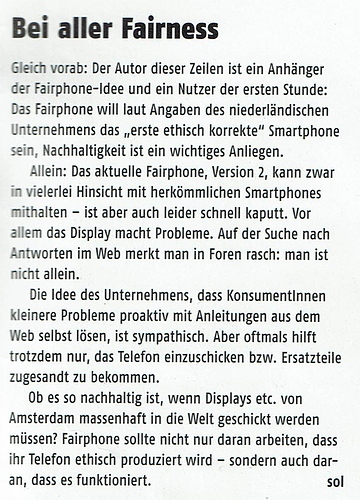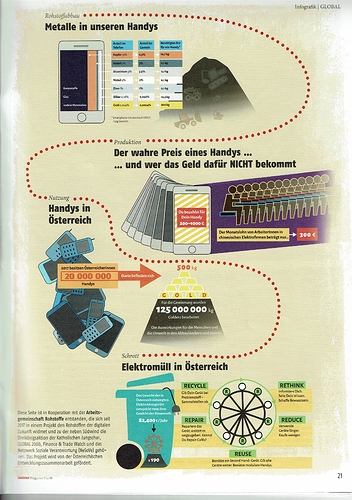Yes, I followed it too and yes I also think there should be more regulation by governments. On the other hand we in Germany have something called “economic autonomy” which other developed countries probably also have in a way. So how much influence would do good and when will it rather cause (damage) or take too much responsibility from the management.
But looking at e.g. the diesel-gate we also could be witness of how “economic autonomy” can go fataly wrong.
Yes, I agree. Unfortunately as I can see here in Germany more and more responsibility is left to “the customer”. If there is a discussion going on often it is stated by government spokesmen that it´s up to the customers decision so he may take influence in market developments. Fine, but that´s not a general solution for all issues as can be watched and it’s not what for we have politicians after all.
@BertG
Yes true. Since several years we have offers to have a new phone for 0€ or 1€ for a contract extension or new contract or a high class model for much lower than the real price. Dealers could never catch me, but I always thought this is a negative development. And now signs become clearer that it is one among other developments turning out to massively grow the dump pile and even has a stronger negative multi-impact.
Actually FP2 is my second new mobile within 25 years.
First Nokia 6150 (>500.- DM) with the shortest possible contract at O² (formerly Viag Intercom with it´s unique “home zome”) of only 3 months to see if the mobile technique is even working and worth paying money for. Now FP2, you know the price.
But receiving a new phone for an apple and a egg
of course pushes many users to give in and snatch it being in need of it or not.
But for whatever reason many used phones are often not sold second-hand but rott in a drawer, maybe for sentimental reasons or whatever.
I think mobiles would be treated with more care and value if they were (much) more expensive. Draining them in the toilet or simply dropping them would hurt much more and users probably would try harder to prevent this.
But relating to Stefans thread about Greenwashing governments should surely take influence on pricing.
Simply compare the cost break-down of FP and imagine how it may look at Apple or Samsung.
In the 90’s there was an overall win of maybe 1%-100% per unit of whatever was sold. But today?? 100% win still seems not to be enough per unit. There must be 500%, 1000%, no problem - the sky is the limit. Buy or die.
But look who’s actually doing the job - the managers, shareholders? Surely not! Maybe the poor souls at
Foxconn or diggers in third-world countries.
So this is where governments should take more control into the market to regulate a better balance between wins, costs of raw materials, salaries, sales prices, social values etc. and also force companies to take over more responsibility for the full live cycle of their products - not sell and forget or leave the (uncomfortable) rest to the customers.
https://forum.fairphone.com/t/the-green-lie-greenwashing-and-what-to-do-about-it/39476/7
That’s the point. FPs cost breakdown is available to the public. I believe there are not many companies revealing such and if they do…how truthfull may it be??
There is a lot of cheating going on. Just imagine for youself, how would it look like to see a product is being sold with >500% win per unit?
Would it look good in a breakdown to see the raw materials are only (a simple guess) 1% and salaries for manufacturing maybe 7%?
The price barrier of >$1000 for a new smartphone was broken by Apple.
I have doubts it is a complete new design from scratch legitimating this price.
So, it should clearly point out who actually makes his cut just as one sentence states “Investors should buy Apple shares because the more expensive iPhone 8 launching later this year will drive earnings above expectations”.
This price should include a noticable percentage of
and governments should have a close eye on it so they are actually fulfilled.





 Germanwatch vergleicht Fairphone 2, Shiftphone 5.3, iPhone X und Samsung Galaxy S8 in sozialer und ökologischer Hinsicht, inbesondere mit Blick auf Reparierbarkeit.
Germanwatch vergleicht Fairphone 2, Shiftphone 5.3, iPhone X und Samsung Galaxy S8 in sozialer und ökologischer Hinsicht, inbesondere mit Blick auf Reparierbarkeit. NGO Germanwatch has compared the FP2, the Shiftphone 5.3, the iPhone X and the Samsung Galaxy S8 with regard to social and ecologial aspects, especially repairability. Article in German only, includes a detailed comparison table though. Free PDF download below the big picture.
NGO Germanwatch has compared the FP2, the Shiftphone 5.3, the iPhone X and the Samsung Galaxy S8 with regard to social and ecologial aspects, especially repairability. Article in German only, includes a detailed comparison table though. Free PDF download below the big picture. The german news broadcasting service WDR 5 has analyzed the interest of the hardware vendors in sustainability of their devices on the trade fair MWC (mobile world congress) in Barcelona a few weeks ago. They have referred to Fairphone several times, but also mentioned that the most sustainable smartphone is the phone you keep using for the longest time.
The german news broadcasting service WDR 5 has analyzed the interest of the hardware vendors in sustainability of their devices on the trade fair MWC (mobile world congress) in Barcelona a few weeks ago. They have referred to Fairphone several times, but also mentioned that the most sustainable smartphone is the phone you keep using for the longest time.